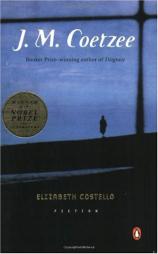Elizabeth Costello
Review
Elizabeth Costello
"There is first of all the problem of the opening, namely, how to
get us from where we are, which is, as yet, nowhere, to the far
bank. It is a simple bridging problem, a problem of knocking
together a bridge."
In J. M. Coetzee's new novel, ELIZABETH COSTELLO, these first
sentences greet the reader as a comment on first sentences, a
self-conscious opening that makes clear the novelist's job: to
bridge the gap between reality, "which is, as yet, nowhere," and
fiction, "the far bank."
Before leading us into "the far territory, which is where we want
to be," he introduces us to his title character: "Elizabeth
Costello is a writer, born in 1928. She has written nine novels,
two books of poems, a book on bird life, and a body of journalism.
By birth she is Australian. Elizabeth Costello made her name with
her fourth novel, THE HOUSE ON ECCLES STREET (1969), whose main
character is Marion Bloom, wife of Leopold Bloom, principal
character of another novel, ULYSSES (1922), by James Joyce."
Literature and the lives of writers are just two of the freighted
topics Coetzee, winner of the 2003 Nobel Prize for Literature,
expounds upon through his title character. Structured as a series
of lectures Costello delivers around the world, this novel of ideas
addresses the nature of realism, the rights of animals, and the
problem of evil.
ELIZABETH COSTELLO is never showy; rather, the emphasis is on quiet
technique-subtle, focused metafiction. It is a novel that looks for
its own logic, and Coetzee locates it in ideas and arguments, the
presentation, discussion and repudiation of which structure the
novel vibrantly and rationally.
Each section explores various approaches to the essence of writing.
In the opener, entitled "Realism," Costello delivers a public
lecture arguing that ideas presented through fiction cannot be
autonomous, but must be anchored in objects and given voice by
characters. As the chapter unfolds, Coetzee heeds this argument,
setting up a trio of characters --- Costello, her son John, and an
academic named Susan Moebius --- who throughout the chapter will
voice different ideas that will control their own actions and
responses toward each other.
At another event Costello talks about the "willed ignorance" of an
entire generation of Germans prior to and during World War II ---
people who were aware of the concentration camps but convinced
themselves and the world that they didn't know what evils lurked so
close. She uses this as a metaphor for the mass slaughter of
animals in farms and abattoirs, a comparison many in her audience
find condemnable. Furthermore, if we cannot grasp such large
numbers of victims --- if, as she herself states, we "cannot count
to a million deaths" --- how can we count to a million passive
sinners who are allowing such exploitive animal massacre to take
place?
The point is that Costello's ideas are not always sound --- her
lectures are never very well received and her ideas are met with
scorn and disregard. Even she doubts her own arguments and
questions their logic. She agonizes in "The Problem of Evil" over
whether to lecture on literature "as a form of moral
adventurousness, [which] has the potential to be dangerous."
Feeling it is her job as a writer to present the undecorated truth,
she goes ahead with her talk, only to realize immediately the
critical flaw in her argument.
In other words, in her old age and out-of-step extremism, Costello
is prone to self-doubt and self-incrimination; she argues most with
herself and is her own most belligerent critic. But the
unreliability of her logic does not weaken the book, but
strengthens it by anchoring the arguments in her vulnerable
character.
What seems to be missing from ELIZABETH COSTELLO is her fiction,
surely an intended omission. That she does not read from any of her
novels at these lectures is telling: her oeuvre is the god
off-screen, never glimpsed but exerting a mighty influence. This
gaping absence makes these episodes all the more theoretical in
nature, but it also implies that contemporary writers --- in fact,
all writers --- bear a public responsibility that transcends
bestseller lists and book signings. They have a duty to traffic in
ideas and promote free thought, and whether they are wrong or right
matters very little. In Coetzee's view, a writer's most important
tasks are to make us reconsider our own intensely guarded ideas, if
only briefly, and to allow us to empathize with other humans.
"There is no limit to the extent to which we can think ourselves
into the being of another," Coetzee reminds us. "There are no
bounds to the sympathetic imagination."
Reviewed by Stephen M. Deusner on January 21, 2011
Elizabeth Costello
- Publication Date: October 26, 2004
- Genres: Fiction
- Paperback: 240 pages
- Publisher: Penguin (Non-Classics)
- ISBN-10: 0142004812
- ISBN-13: 9780142004814




